 W
WJohn Barclay was an American soldier, politician, and jurist. He served in the Continental Army during the American Revolution. He served as President Judge of the Courts of Bucks County, Pennsylvania, alderman in Philadelphia and as Mayor of Philadelphia from 1791 to 1793. He worked as president of the Bank of Pennsylvania and was one of the founders of the Insurance Company of North America. He served as a Federalist member of the Pennsylvania State Senate for the 1st district from 1811 to 1813.
 W
WJohn Beatty was an American physician and statesman from Princeton, New Jersey.
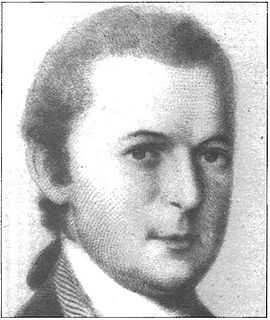 W
WColonel Clement Biddle was an American Revolutionary War soldier.
 W
WElias Boudinot was a lawyer and statesman from Elizabeth, New Jersey who was a delegate to the Continental Congress and served as President of Congress from 1782 to 1783. He was elected as a U.S. Congressman for New Jersey following the American Revolutionary War. He was appointed by President George Washington as Director of the United States Mint, serving from 1795 until 1805.
 W
WEdward Carrington was an American soldier and statesman from Virginia. During the American Revolutionary War he became a lieutenant colonel of artillery in the Continental Army. He distinguished himself as quartermaster general in General Nathanael Greene’s southern campaign. He commanded artillery at Monmouth and Yorktown. He was also present at Cowpens, Guilford Court House, and Hobkirk's Hill. During the war he became a close friend of George Washington. Carrington served in the 3rd Continental Congress and was the first US Marshal appointed from his state. He was an original member of the Society of the Cincinnati.
 W
WDr. Benjamin Church was effectively the first Surgeon General of the United States Army, serving as the "Chief Physician & Director General" of the Medical Service of the Continental Army from July 27, 1775 to October 17, 1775. He was also active in Boston's Sons of Liberty movement in the years before the war. However, early in the American Revolution, Church was also sending secret information to General Thomas Gage, the British commander, and when one of his letters into Boston was intercepted, he was tried and convicted of "communicating with the enemy". He was jailed but eventually released, likely dying somewhere in the Caribbean Sea in 1778.
 W
WJames Craik was Physician General of the United States Army, as well as George Washington's personal physician and close friend.
 W
WJohn Davenport was a United States Representative from Connecticut.
 W
WThe Rev. William Emerson was one of Boston's leading citizens, a liberal-minded Unitarian minister, pastor to Boston's First Church and founder of its Philosophical Society, Anthology Club, and Boston Athenaeum, and father to Ralph Waldo Emerson.
 W
WHoratio Lloyd Gates was a British-born American army officer who served as a general in the Continental Army during the early years of the Revolutionary War. He took credit for the American victory in the Battles of Saratoga (1777) – a matter of contemporary and historical controversy – and was blamed for the defeat at the Battle of Camden in 1780. Gates has been described as "one of the Revolution's most controversial military figures" because of his role in the Conway Cabal, which attempted to discredit and replace General George Washington; the battle at Saratoga; and his actions during and after his defeat at Camden.
 W
WNicholas Gilman Jr. was a soldier in the Continental Army during the American Revolutionary War, a delegate to the Continental Congress, and a signer of the U.S. Constitution, representing New Hampshire. He was a member of the United States House of Representatives during the first four Congresses and served in the U.S. Senate from 1805 until his death in 1814.
 W
WGriffin Greene (1749–1804) served as a commissary, paymaster, and quartermaster to the Continental Army during the American Revolutionary War. He was subsequently a pioneer to the Ohio Country, helping establish Marietta, Ohio as the first permanent American settlement of the new United States in the Northwest Territory.
 W
WRobert Hanson Harrison was an American Army officer, attorney, and judge. He was a Continental Army veteran of the American Revolution and is most notable for his service as George Washington's military secretary, the de facto chief of staff of Washington's headquarters for most of the war.
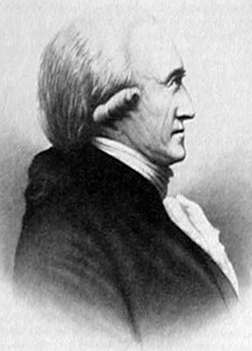 W
WBenjamin Hawkins was an American planter, statesman, U.S. Indian agent, and "a ruthless slave trader". He was a delegate to the Continental Congress and a United States Senator from North Carolina, having grown up among the planter elite. Appointed by George Washington in 1796 as one of three commissioners to the Creeks, in 1801 President Jefferson named him "principal agent for Indian affairs south of the Ohio [River]", and was principal Indian agent to the Creek Indians.
 W
WWilliam Jackson was a figure in the American Revolution, most noteworthy as the secretary to the United States Constitutional Convention. He also served with distinction in the Continental Army during the Revolutionary War. After the war he served as one of President George Washington's personal secretaries.
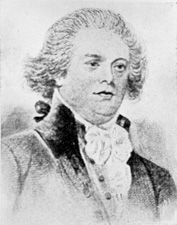 W
WJohn Laurance was a delegate to the 6th, 7th and 8th Congresses of the Confederation, a United States Representative and United States Senator from New York and a United States District Judge of the United States District Court for the District of New York.
 W
WJohn Laurens was an American soldier and statesman from South Carolina during the American Revolutionary War, best known for his criticism of slavery and his efforts to help recruit slaves to fight for their freedom as U.S. soldiers.
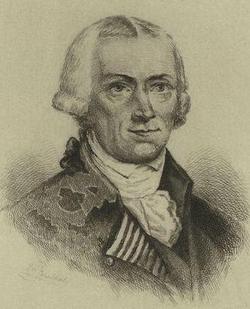 W
WWalter Livingston was an American merchant, lawyer and politician.
 W
WCharles McKnight was an American physician during and after the American Revolutionary War. He served as a surgeon and physician in the Hospital Department of the Continental Army under General George Washington and other subordinate commanders. McKnight was one of the most respected surgeons of his day and was remembered by one colleague as "particularly distinguished as a practical surgeon … at the time of his death (he) was without a rival in that branch of his profession."
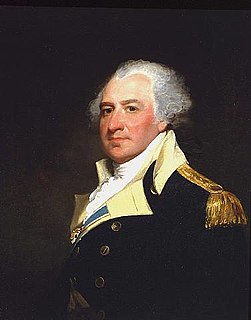 W
WThomas Mifflin was an American merchant, soldier, and politician from Philadelphia, Pennsylvania. He served in a variety of roles during and after the American Revolution, several of which qualify him to be counted among the Founding Fathers. He was the first Governor of Pennsylvania, serving from 1790 to 1799; he was also the last President of Pennsylvania, succeeding Benjamin Franklin and serving from 1788 until 1790.
 W
WJohn Morgan, "founder of Public Medical Instruction in America," was co-founder of the Medical College at the University of Pennsylvania, the first medical school in Colonial America; and he served as the second "Chief physician & director general" of the Continental Army. He was an early member of the American Philosophical Society, elected in 1766, where he served as Curator from 1769-1770.
 W
WJames O'Hara (1752?–1819) was an American military officer, businessman, and captain of early industry in Pittsburgh, Pennsylvania, United States.
 W
WCharles Pettit was an American lawyer and merchant from New Jersey and Philadelphia, Pennsylvania. He served as a delegate for Pennsylvania to the Confederation Congress from 1785 to 1787.
 W
WTimothy Pickering was the third United States Secretary of State under Presidents George Washington and John Adams. He also represented Massachusetts in both houses of Congress as a member of the Federalist Party. In 1795, he was elected a member of the American Philosophical Society.
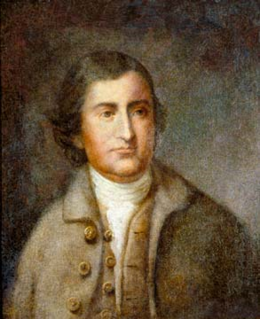 W
WEdmund Jennings Randolph was an American attorney and politician. He was the 7th Governor of Virginia, and, as a delegate from Virginia, he attended the Constitutional Convention and helped to create the national constitution while serving on its Committee of Detail. He was the 1st United States Attorney General and subsequently the 2nd Secretary of State during George Washington's presidency.
 W
WJoseph Reed was a lawyer, military officer and statesman of the American Revolutionary Era who lived the majority of his life in Pennsylvania. He served as a delegate to the Continental Congress and, while in Congress, signed the Articles of Confederation. He also served as President of Pennsylvania's Supreme Executive Council, a position analogous to the modern office of Governor.
 W
WAlexander Scammell was a Harvard educated attorney and an officer in the Continental Army during the American Revolutionary War. He was wounded on September 30, 1781, near Yorktown and subsequently died on October 6 in Williamsburg, Virginia, making him, a colonel, the highest ranking American officer killed during the Siege of Yorktown.
 W
WWilliam Shippen Jr., was the first systematic teacher of anatomy, surgery and obstetrics in Colonial America and founded the first maternity hospital in America. He was the 3rd Director General of Hospitals of the Continental Army.
 W
WFriedrich Wilhelm August Heinrich Ferdinand von Steuben, also referred to as Baron von Steuben, was a Prussian and later an American military officer. He served as Inspector General and a Major General of the Continental Army during the American Revolutionary War. He was one of the fathers of the Continental Army in teaching them the essentials of military drills, tactics, and discipline. He wrote Regulations for the Order and Discipline of the Troops of the United States, the book that served as the Army's drill manual for decades. He served as General George Washington's chief of staff in the final years of the war. In 1780, von Steuben was elected a member of the American Philosophical Society.
 W
WCharles Stewart (1729–1800) was an officer during the American Revolutionary War and a Continental Congressman.
 W
WJonathan Trumbull Jr. was an American politician who served as the 20th governor of Connecticut and the second Speaker of the United States House of Representatives.
 W
WJoseph Trumbull, son of Governor Jonathan Trumbull of Connecticut, was the first commissary general of the Continental Army during the American Revolutionary War.
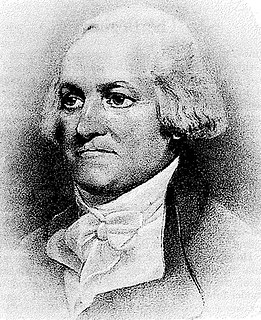 W
WWilliam Tudor was a wealthy lawyer and leading citizen of Boston. His eldest son William Tudor (1779-1830) became a leading literary figure in Boston. Another son, Frederic Tudor, founded the Tudor Ice Company and became Boston's "Ice King", shipping ice to the tropics from many local sources of fresh water including Walden Pond, Fresh Pond, and Spy Pond in Arlington, Massachusetts.
 W
WJames Warren was the President of the Massachusetts Provincial Congress and a Paymaster General of the Continental Army during the American Revolutionary War, among other positions. He is also famous as the husband of Mercy Otis Warren and for his outspoken courage as an Anti-Federalist. General James Warren is sometimes confused with the two other Massachusetts Revolutionaries, the brothers Joseph Warren and John Warren, but they were not at all closely related, merely had similar names and views.
 W
WJames Wilkinson was an American soldier and statesman, who was associated with several scandals and controversies.